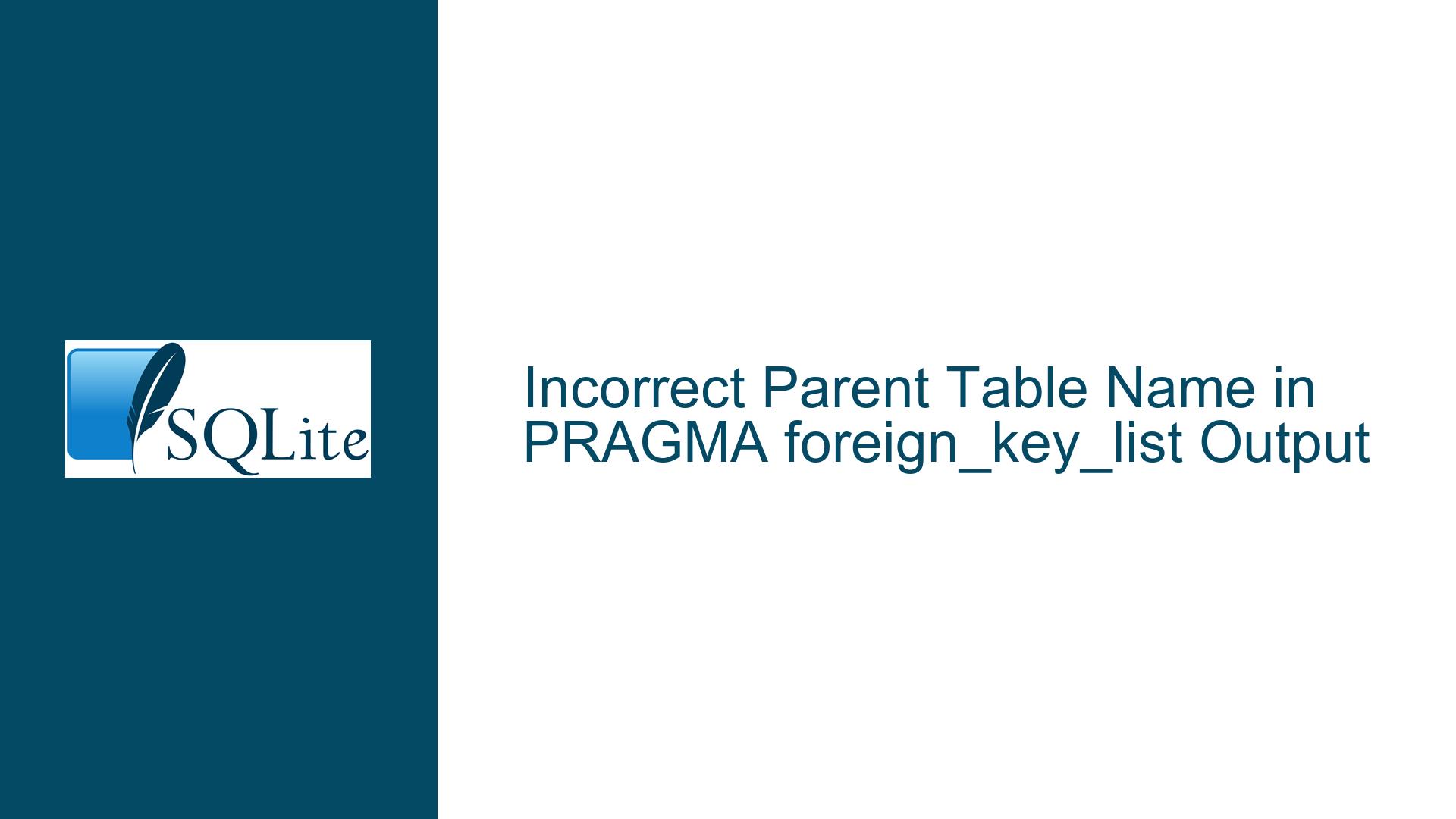Incorrect Parent Table Name in PRAGMA foreign_key_list Output
Issue Overview: Mismatch Between Expected and Actual Foreign Key Table References
When working with foreign key constraints in SQLite, developers rely on the PRAGMA foreign_key_list(table-name) command to retrieve metadata about relationships between tables. This metadata includes critical details such as the parent (referenced) table name, child (source) columns, parent columns, and referential actions (e.g., ON DELETE CASCADE).
The core issue arises when the table field (second column) in the output of PRAGMA foreign_key_list erroneously returns the name of the child table (the table specified in the pragma call) instead of the parent table it references. For example, if a table Orders has a foreign key constraint pointing to Customers(id), the expected value in the table column should be Customers. However, in the problematic scenario, the table field displays Orders, rendering the output inconsistent with the documented behavior of the pragma.
This discrepancy undermines the ability to programmatically resolve foreign key relationships, validate schema integrity, or generate accurate entity-relationship diagrams. Without correct parent table names, downstream tools or scripts that parse foreign key metadata may fail or produce incorrect mappings.
Possible Causes: Origins of the Parent Table Name Mismatch
Misconfiguration in Foreign Key Constraints
The foreign key constraint might have been defined incorrectly during table creation. A typographical error or syntax oversight in theREFERENCESclause could cause SQLite to misinterpret the parent table. For instance:CREATE TABLE Orders ( id INTEGER PRIMARY KEY, customer_id INTEGER, FOREIGN KEY (customer_id) REFERENCES Orders(id) -- Incorrect self-reference );Here, the parent table is erroneously set to
Ordersinstead ofCustomers.SQLite Version-Specific Bugs or Edge Cases
Older versions of SQLite (prior to 3.20.0) had limitations in handling certain foreign key configurations, such as deferred constraints or composite keys. A version-specific bug might cause thePRAGMA foreign_key_listoutput to misreport the parent table name under rare conditions.Schema Corruption or Incomplete Writes
If the database file was not closed properly after schema modifications (e.g., due to an application crash), the internal schema cache might not reflect the latest foreign key definitions. This can lead to inconsistent pragma output until the schema is reloaded.Misinterpretation of Pragma Output Columns
ThePRAGMA foreign_key_listreturns eight columns:id,seq,table,from,to,on_update,on_delete, andmatch. Confusion between thefrom(child column) andtable(parent table) fields might create the illusion of incorrect data.Improper Pragma Invocation or Scope
If the pragma is executed without specifying the correct child table name, or if it is run against a database connection where foreign key enforcement is disabled (PRAGMA foreign_keys=OFF), the results might appear inconsistent.
Troubleshooting Steps, Solutions & Fixes: Resolving Parent Table Name Discrepancies
Step 1: Validate Foreign Key Constraint Definition
Begin by verifying the schema of the table exhibiting the issue. Use the .schema command in the SQLite CLI or query sqlite_master:
SELECT sql FROM sqlite_master WHERE type='table' AND name='Orders';
Examine the FOREIGN KEY clauses to ensure the parent table is correctly specified. For example:
FOREIGN KEY (customer_id) REFERENCES Customers(id)
If the parent table is incorrectly named, drop and recreate the constraint.
Step 2: Reproduce the Issue in a Minimal Test Case
Construct a self-contained script to isolate the problem. Use the official SQLite CLI to eliminate third-party tool interference:
-- Create parent and child tables
CREATE TABLE Customers (id INTEGER PRIMARY KEY);
CREATE TABLE Orders (
id INTEGER PRIMARY KEY,
customer_id INTEGER,
FOREIGN KEY (customer_id) REFERENCES Customers(id)
);
-- Query foreign key metadata
PRAGMA foreign_key_list(Orders);
The expected output should include a row where the table column is Customers. If the table column instead shows Orders, the issue is reproducible and indicates a potential SQLite bug.
Step 3: Verify SQLite Version and Build Details
Execute SELECT sqlite_version(); to determine the SQLite version. Older versions (e.g., 3.7.16 or earlier) lack robust foreign key enforcement and might mishandle pragma output. If using an outdated version, upgrade to the latest stable release and retest.
Step 4: Check Foreign Key Enforcement Status
Foreign key constraints are only enforced if PRAGMA foreign_keys=ON is set. While this does not affect schema metadata retrieval, some tools might misbehave if foreign keys are disabled. Confirm the setting:
PRAGMA foreign_keys;
If disabled (0), enable it and rerun the pragma:
PRAGMA foreign_keys=ON;
PRAGMA foreign_key_list(Orders);
Step 5: Inspect Database Integrity
Use PRAGMA integrity_check; to identify corruption in the database file. Schema corruption can cause metadata inconsistencies. If errors are reported, restore from a backup or recreate the database.
Step 6: Cross-Validate with Alternative Metadata Queries
Compare the output of PRAGMA foreign_key_list with the sqlite_master table and PRAGMA table_info. For example:
-- Retrieve child columns involved in foreign keys
PRAGMA foreign_key_list(Orders);
-- Retrieve parent table structure
PRAGMA table_info(Customers);
Inconsistencies between these outputs may reveal deeper schema issues.
Step 7: Report the Issue to SQLite Maintainers
If the problem persists in the latest SQLite version with a minimal test case, submit a bug report via the SQLite Forum. Include:
- The reproducible script.
- SQLite version and build source (e.g., amalgamation, system package).
- Environment details (OS, architecture).
Final Fixes and Workarounds
- Schema Correction: Redefine the foreign key constraint with the correct parent table.
- Version Upgrade: Migrate to SQLite 3.37.0 or later, which introduced stricter foreign key checks.
- Manual Metadata Parsing: Extract parent table names directly from the
sqlite_mastertable if pragma output is unreliable.
By methodically validating the schema, environment, and SQLite behavior, developers can resolve parent table mismatches and ensure reliable foreign key metadata retrieval.






